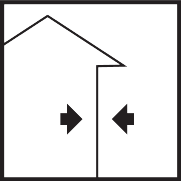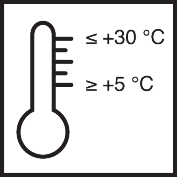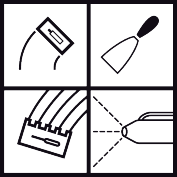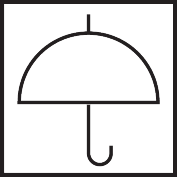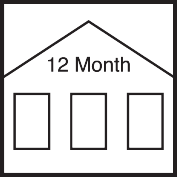Article No. 050520
Infiller mortar
Product specifications
The stated values represent typical product characteristics and are not to be construed as binding product specifications.
Field of application
- Mineral infiller mortar, undercoat and finishing coat render for framework constructions
Properties
- Promotes drying
- Single-layered application thickness 30 - 80 mm as an infiller mortar
- Single-layered application thickness 10 - 30 mm as a rendering mortar
-
Preparation
-
Substrate requirements
Clean, dust-free and capable of supporting a load.
-
Preparations
Check any remaining old infilling to verify that it is structurally stable and can be sufficiently covered (at least 3 cm).
Protect the surface of the framework against dirt.
Use industry standard chamfer strips or trapezoidal strips to secure the infill.
When the framework is completely filled, attach formwork on one side.
Existing staking can be used for support.
Work wooden parts to be covered back down to the sound wood.
Replace missing wooden elements with similar ones.
-
-
Application
-
Apply mortar by hand; for layer thicknesses greater than 15 mm, throw on or apply using a rendering machine.
Complete filling of framework is carried out in multiple individual layers of up to approx. 15 mm below what will later be the final surface, at a rate of max. 80 mm layer thickness/day.
Rendering of framework is carried out in multiple individual layers of up to approx. 15 mm below what will later be the final surface, at a rate of max. 30 mm layer thickness/day.
Strip and roughen the surface in preparation for applying further render layers.
Using a knife, separate individual render layers from the wood on all sides.
Waiting time before applying the finishing coat: 1 day/mm layer thickness.
Once the finishing coat has lost its gloss, carefully rub it with a soft sponge float.
-
Application instructions
-
Once it has hardened, mortar must not be made workable again by adding either water or more wet mortar.
Protect wet mortar surfaces against frost, rain and drying out too quickly for at least 4 days.
Hairline/shrinkage cracks are safe and are not cause for complaint as they do not impair the properties of the mortar.
-
-
Working tools / cleaning
-
Mixing tool, levelling rule (aluminium), scraper, trowel, render comb, broom, nail float
-
Mixing tool, trowel, smoothing trowel, float (aluminium), render comb, broom, grated scraper, render scraper, sponge float
Clean tools and equipment with water before the mortar sets.
-
Storage / shelf life
-
If stored in an unopened container and in a dry place, the product will keep for approx. 12 months.
-
Usage
-
Approx. 7.0 kg/m²/cm layer thickness
-
General information
-
May contain traces of pyrite (iron sulphide).
The characteristic data of the product were calculated under laboratory conditions at 20°C and 65% relative humidity.
The mixing water must be of drinking water quality.
Always set up a trial area/trial areas first.
Do not use on gypsum-based substrates.
Current regulations and legal requirements must be taken into account and deviations from these must be agreed separately.
The relevant test certificates must be observed when planning and carrying out work.
-
-
Disposal instructions
-
Larger quantities of leftover product should be disposed of in the original containers in accordance with the applicable regulations. Completely empty, clean containers should be recycled. Do not dispose of together with household waste. Do not allow to enter the sewage system. Do not empty into drains.
-
-
Safety / regulations
-
For further information on the safety aspects of transporting, storing and handling the product and on disposal and environmental matters, please see the current Safety Data Sheet.
-

